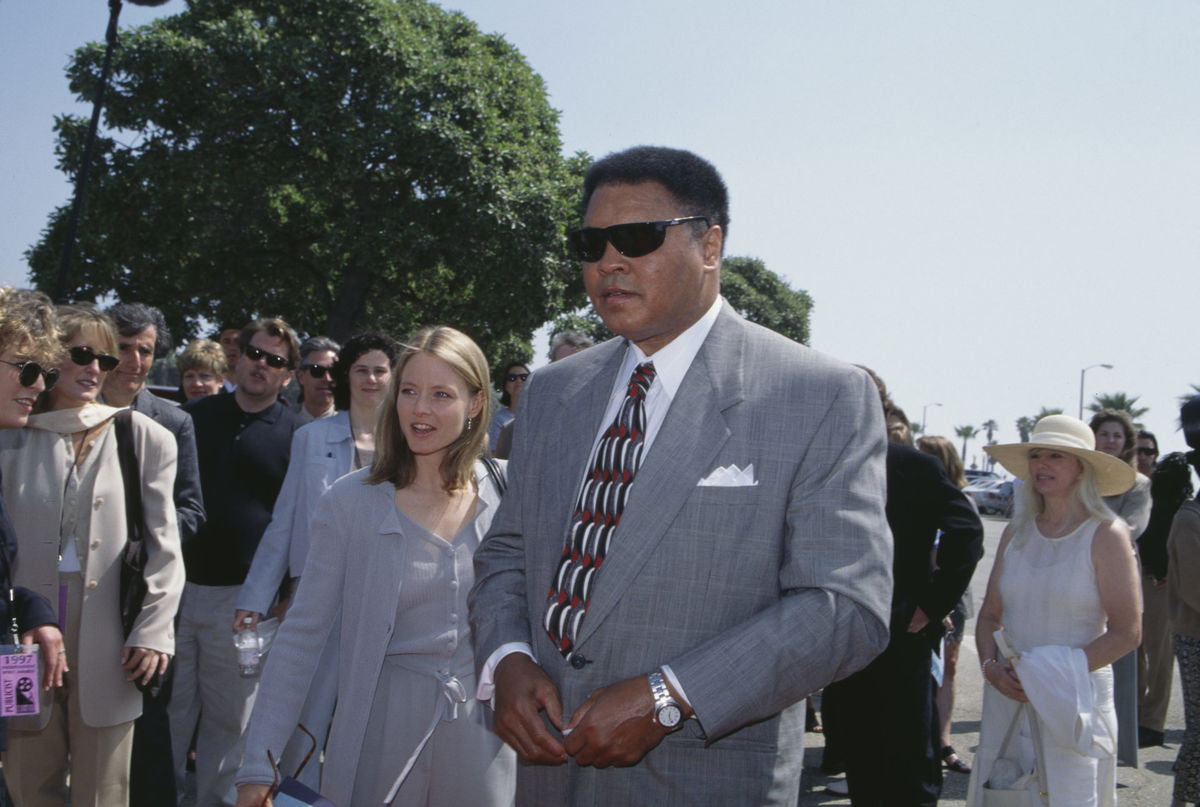
Getty
American actress and director Jodie Foster and boxer Muhammad Ali (1942 – 2016) at the 12th Annual IFP/West Independent Spirit Awards at Santa Monica Beach in Santa Monica, California, 22nd March 1997. (Photo by Vinnie Zuffante/Michael Ochs Archives/Getty Images)

Getty
American actress and director Jodie Foster and boxer Muhammad Ali (1942 – 2016) at the 12th Annual IFP/West Independent Spirit Awards at Santa Monica Beach in Santa Monica, California, 22nd March 1997. (Photo by Vinnie Zuffante/Michael Ochs Archives/Getty Images)
In a recent Instagram video, Muhammad Ali’s unwavering convictions echo loudly. The late boxing legend, known for his unmatched prowess inside the ring, defended his principles outside of it. Set against the tumultuous backdrop of the Vietnam War, this clip captures a tense courtroom exchange. Ali’s refusal to join the military, grounded in his strong religious beliefs, made headlines.
Facing a commissioner, Ali’s responses are nothing short of audacious. This isn’t just about a boxer’s anti-war stance. It’s a rare glimpse into a champion’s fight for personal respect, identity, and racial equality. Yet, the video doesn’t reveal everything. What led to this confrontation? Why was Ali’s name so significant? The Revolutionary Boxer’s convictions, both inside and outside the ring, remain unparalleled.
Identity in the spotlight: The power of Muhammad Ali
Profound civil unrest and powerful voices of dissent marked the Vietnam War era, a tumultuous time in American history. One such voice, echoing louder than most, belonged to the boxing legend Muhammad Ali. His refusal to join the military, while deeply grounded in his Islamic beliefs, became a defining moment in his life, casting him into a vortex of controversies and legal battles.
As the curtains lift on one of his courtroom confrontations, the atmosphere is palpable with tension. The commissioner, seeking to corner Ali, begins, “I’m asking you if you apologize for the unpatriotic remarks you made.” Without missing a beat, Ali fires back, “I’m not apologizing for nothing like that because I don’t have to. I’m just apologizing for what I said to the newspapers and to the press.”
View this post on Instagram
However, the conversation takes a deeper turn when it touches upon Ali’s identity. The commissioner’s attempt to address him as “Mr. Clay” is met with swift correction. Ali firmly interjects, “Muhammad Ali, sir.” Repeated attempts by the commissioner to use his birth name are met with the same unyielding response. This exchange, more than just about a name, symbolizes Ali’s fight for his personal and racial identity.
Further, the commissioner brings into focus Ali’s claim of being the “people’s champion.” Questioning his title, he asks, “Do you think you’re acting like a people’s champion?” Ali’s response, firm and unhesitant, is a simple, “Yes sir!” This verbal exchange underscores Ali’s unwavering conviction, his commitment to his beliefs, and his unrelenting spirit in the face of adversity.
Also Read: Mobile Game Brings Limited Edition Muhammad Ali Character To Life
As we marvel at the legacy of The Revolutionary Boxer, one can’t help but wonder: How many of us possess the courage to stand unwaveringly for our convictions, especially when faced with overwhelming odds?
Watch this story: Muhammad Ali’s Last 5 Professional Boxing Matches

